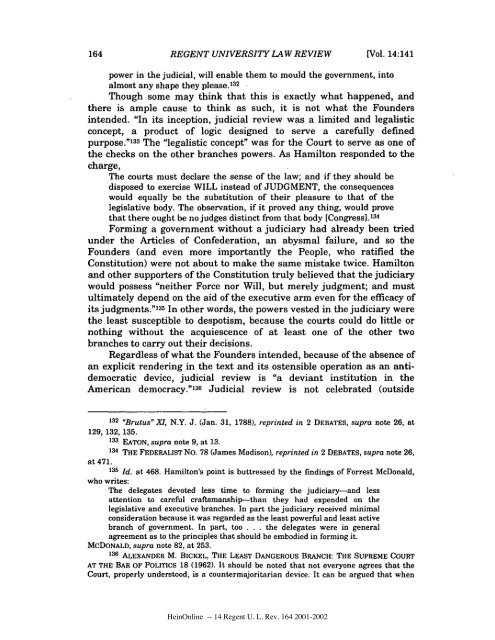Judicial ReEngineering
Judicial ReEngineering
Judicial ReEngineering
You also want an ePaper? Increase the reach of your titles
YUMPU automatically turns print PDFs into web optimized ePapers that Google loves.
REGENT UNIVERSITY LAW REVIEW<br />
[Vol. 14:141<br />
power in the judicial, will enable them to mould the government, into<br />
almost any shape they please. 132<br />
Though some may think that this is exactly what happened, and<br />
there is ample cause to think as such, it is not what the Founders<br />
intended. "In its inception, judicial review was a limited and legalistic<br />
concept, a product of logic designed to serve a carefully defined<br />
purpose." 133 The "legalistic concept" was for the Court to serve as one of<br />
the checks on the other branches powers. As Hamilton responded to the<br />
charge,<br />
The courts must declare the sense of the law; and if they should be<br />
disposed to exercise WILL instead of JUDGMENT, the consequences<br />
would equally be the substitution of their pleasure to that of the<br />
legislative body. The observation, if it proved any thing, would prove<br />
that there ought be no judges distinct from that body [Congress]. 134<br />
Forming a government without a judiciary had already been tried<br />
under the Articles of Confederation, an abysmal failure, and so the<br />
Founders (and even more importantly the People, who ratified the<br />
Constitution) were not about to make the same mistake twice. Hamilton<br />
and other supporters of the Constitution truly believed that the judiciary<br />
would possess "neither Force nor Will, but merely judgment; and must<br />
ultimately depend on the aid of the executive arm even for the efficacy of<br />
its judgments." 135 In other words, the powers vested in the judiciary were<br />
the least susceptible to despotism, because the courts could do little or<br />
nothing without the acquiescence of at least one of the other two<br />
branches to carry out their decisions.<br />
Regardless of what the Founders intended, because of the absence of<br />
an explicit rendering in the text and its ostensible operation as an antidemocratic<br />
device, judicial review is "a deviant institution in the<br />
American democracy." 136 <strong>Judicial</strong> review is not celebrated (outside<br />
132 "Brutus" XI, N.Y. J. (Jan. 31, 1788), reprinted in 2 DEBATES, supra note 26, at<br />
129, 132, 135.<br />
133 EATON, supra note 9, at 13.<br />
134 THE FEDERALIST No. 78 (James Madison), reprinted in 2 DEBATES, supra note 26,<br />
at 471.<br />
135 Id. at 468. Hamilton's point is buttressed by the findings of Forrest McDonald,<br />
who writes:<br />
The delegates devoted less time to forming the judiciary-and less<br />
attention to careful craftsmanship-than they had expended on the<br />
legislative and executive branches. In part the judiciary received minimal<br />
consideration because it was regarded as the least powerful and least active<br />
branch of government. In part, too . . . the delegates were in general<br />
agreement as to the principles that should be embodied in forming it.<br />
MCDONALD, supra note 82, at 253.<br />
136 ALEXANDER M. BICKEL, THE LEAST DANGEROUS BRANCH: THE SUPREME COURT<br />
AT THE BAR OF POLITICS 18 (1962). It should be noted that not everyone agrees that the<br />
Court, properly understood, is a countermajoritarian device. It can be argued that when<br />
HeinOnline -- 14 Regent U. L. Rev. 164 2001-2002

















